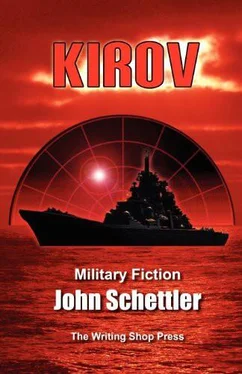John Schettler - Kirov
Здесь есть возможность читать онлайн «John Schettler - Kirov» весь текст электронной книги совершенно бесплатно (целиком полную версию без сокращений). В некоторых случаях можно слушать аудио, скачать через торрент в формате fb2 и присутствует краткое содержание. Жанр: Фантастика и фэнтези, Альтернативная история, на английском языке. Описание произведения, (предисловие) а так же отзывы посетителей доступны на портале библиотеки ЛибКат.
- Название:Kirov
- Автор:
- Жанр:
- Год:неизвестен
- ISBN:нет данных
- Рейтинг книги:5 / 5. Голосов: 1
-
Избранное:Добавить в избранное
- Отзывы:
-
Ваша оценка:
- 100
- 1
- 2
- 3
- 4
- 5
Kirov: краткое содержание, описание и аннотация
Предлагаем к чтению аннотацию, описание, краткое содержание или предисловие (зависит от того, что написал сам автор книги «Kirov»). Если вы не нашли необходимую информацию о книге — напишите в комментариях, мы постараемся отыскать её.
Kirov — читать онлайн бесплатно полную книгу (весь текст) целиком
Ниже представлен текст книги, разбитый по страницам. Система сохранения места последней прочитанной страницы, позволяет с удобством читать онлайн бесплатно книгу «Kirov», без необходимости каждый раз заново искать на чём Вы остановились. Поставьте закладку, и сможете в любой момент перейти на страницу, на которой закончили чтение.
Интервал:
Закладка:
Turing had been busy with his own similar machines for some time. He devised clever systems where variables could be represented on a long tape and fed into a machine that could execute instructions and subroutines based on the state of any given variable it was “considering.” It was, in fact, some of the first serious groundbreaking development for digital computers, a device he came to call his “universal machine.”
“Mark my words,” he had told Atkins one day while they were working on it. “These machines will do everything for us in time. Imagine an infinite memory capacity obtained in the form of an infinite tape like this, with a symbol for everything that matters printed out on these little squares. Why, it could do anything, anything we told it to do.”
“Everything that matters, Alan? I’m not sure you could possibly manage that, but I suppose you’ll try. Just be sure we’re the ones doing the telling in that story. I’d hate to think what might happen in a world where these things have a mind of their own.”
“Don’t worry about that,” said Turing. “They can only know what we tell them to know, and it’s just a mechanism, Atkins, like a clock-only it will tell us much more than the simple time of day. Yes, it will have an intelligence about it, not a conscious intelligence, mind you. There’s no heart or soul in the thing. That’s our part. The logic and intelligence of this machine will just help us to better use our own. After all, it’s intelligence that will eventually win this war, not the bombs in and of themselves, but knowing where to drop them. That’s the main thing, right?”
Little did he know that the children of his genius would one day defeat the greatest human chess master alive, and that they were already hard at work that same day, aboard a ship he would have a most difficult time placing on his chessboard or fitting into the equations chalked on his blackboard.
Kirov had sailed west away from Jan Mayen, and then turned southwest towards the Denmark Strait on the 1st of August. Radar man Rodenko watched with amusement as the two British ships, Adventure and Anthony, scurried away.
The Admiral had the ship steaming quietly at about twenty knots, just enough to stay ahead of the oncoming weather. They had a long three day cruise at that speed if they were to run the Denmark Strait down into the North Atlantic. Karpov wanted to increase speed to thirty knots and get out quickly, but the Admiral thought it best to give the junior officers time take in the news of what happened and prepare them for the action that might lie ahead. In doing so he sacrificed some advantage of speed and surprise in order to secure his ship and put it on the best possible footing.
“When we turn south we will be sailing into unfriendly waters,” he said. “The men need to know what has happened, and that we may be facing combat situations in short order. It needs time.”
So later that day he had gathered his senior officers and junior petty officers and made a formal announcement concerning their situation. It took some time, and a great deal of explanation, but eventually the loyalty of the crew led them to accept what the Admiral was telling them, and believe his assurances that this was not an exercise any longer. Petty officers were told to keep the news quiet in the rank-and-file ratings. “In time we will bring them all to this table,” he said, “yet for now, I rely on you as leaders, and advise discretion.” Anyone with questions or a serious problem was advised to go and see the Doctor.
“When will we be going home, sir?” one man asked, voicing a question that was surely in the minds and hearts of all gathered.
The Admiral was going to say that they would soon find a way back, but he did not. Instead he just took hold of the man by the shoulder, in an almost gentle way, and he said: “I cannot tell you that with any certainty yet. And it may be that we will never see home again. That’s the truth of it, because we still have no real idea how this happened, or why we are here. I owe you all this truth, and I ask you to help me carry it. It is a heavy burden for any one man, but together, if fate is on our side, we will pull through.”
The words had exactly the effect he intended. He gave them the only thing they really had now-each other, strengthening that invisible, yet unbreakable bond that all soldiers and sailors feel for their comrades in arms. It was enough.
As the news began to slowly spread through the ship, some men laughed off the proposition, others sat with distant, fearful eyes, still others lingered a little longer at the officer’s mess hall leaning close in small groups of two or three, whispering with one another. Digesting this was worse than the beef that would come out of a bad tin on a cold winter’s day. Eventually, however the men realized there was nothing they could really do about the situation other than to man their stations and fulfill their daily duties about the ship. Those with doubts about the story quietly hoped time would prove them right. Others were seen lingering over wrinkled notepaper, writing letters that would never be mailed, pulling pictures out of their wallets and staring at the faces of loved ones they may never see again.
Yet when Orlov would make the daily rounds with a couple of pale faced starshina (petty officers) beside him, things seemed much the same as always. For some men the only disappointment was that they weren't turning about to return to Severomorsk, and for others, young starshina fresh out of the academy, the sudden prospect of an Atlantic cruise seemed very appealing. There is a thirst for discovery on most young men, and for sailors that goes double.
Later in the day, Rodenko noted a distant airborne contact headed their way.
“Con, radar reports airborne contact, bearing one-one-zero, range 226 kilometers at approximately 10,000 feet, inbound at 180 KPH.”
“Another of your museum pieces, Mister Fedorov?” said the Admiral.
“More than likely it's another Fulmar, sir. The British will use them to extend their aerial radar coverage out in front of a task force like this. I would not be at all surprised to learn that those carriers have turned about and are now approaching our position. Once the British get wind of something they will be fairly diligent in pursuing it.”
“We should not allow that contact to re-acquire our position,” said Karpov. “We will lose the element of surprise altogether.”
The Admiral sighed, nodding. It was beginning, he thought. Those first rounds from the 100mm cannon on the nose of the ship were just the opening tapping of a drum heralding the overture that was now about to commence. He had been listening to his ship this last day like a conductor might listen backstage to his orchestra as it tuned before the concert. All the various instruments were quietly playing and tuning themselves, still abuzz with the news he had given them. Yet he saw how his officers gathered them into smoothly functioning groups again, like the first violin sounding the ‘A.’ It was not long before the discordant notes soon fell into harmony again, and the ship continued on, carrying out its daily evolutions with smooth efficiency. Now it was time to step on stage. The curtain was about to rise.
“Mister, Fedorov,” the Admiral turned to his navigator. “What is the range of the radar the British would be using on that plane?”
Fedorov had to reach for a well thumbed volume on his desk, quickly looking up the information in the index. “160 kilometers at best, depending on conditions, sir.”
“Will they see us through our ECM jamming?”
Fedorov slapped his forehead, suddenly remembering. “We’ll be jamming all the wrong frequencies, sir! All our equipment is set to oppose modern day radar sets. We’ll have to re-calibrate to lower frequencies…” He had his nose back in the book again, his finger tracing down the fine print. “The wavelength would be around 7.5 meters.”
Читать дальшеИнтервал:
Закладка:
Похожие книги на «Kirov»
Представляем Вашему вниманию похожие книги на «Kirov» списком для выбора. Мы отобрали схожую по названию и смыслу литературу в надежде предоставить читателям больше вариантов отыскать новые, интересные, ещё непрочитанные произведения.
Обсуждение, отзывы о книге «Kirov» и просто собственные мнения читателей. Оставьте ваши комментарии, напишите, что Вы думаете о произведении, его смысле или главных героях. Укажите что конкретно понравилось, а что нет, и почему Вы так считаете.












